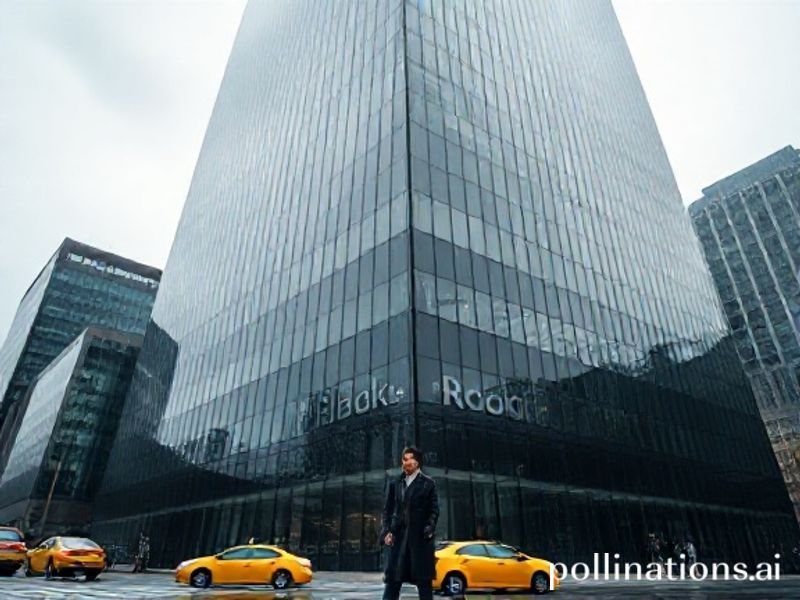BlackRock: The $10 Trillion Shadow Treasury Quietly Rebalancing the Planet
BlackRock: The Shadow Treasury with a Mood Ring
By Our Man in Geneva, nursing a third espresso and counting the milliseconds until the next sovereign default
The first thing you notice when you land in any capital city these days is the luggage carousel. Not the diplomatic plates, not the stray oligarch’s jet—just the carousel, where the bags of finance ministers are indistinguishable from those of BlackRock executives except for the discreet Aladdin thumb-drive lanyards. That little silver rectangle, dear reader, is the skeleton key to roughly ten percent of planet Earth’s listed companies and more sovereign balance sheets than the IMF has had hot dinners. Larry Fink’s crew has become the de-facto shadow treasury for 195 countries, only without the tedious elections.
How did we arrive at a point where a private firm headquartered in midtown Manhattan can send a polite letter to Brussels, Beijing, or Brasília and watch entire parliaments scramble to tick the ESG boxes du jour? Simple: humanity discovered that governments are terrific at printing money, but appallingly bad at investing it. BlackRock simply stepped into that vacuum with the enthusiasm of a substitute teacher discovering the real one has called in sick—permanently.
Start with scale. Ten trillion dollars under management sounds like Monopoly money until you realize it exceeds the GDP of every country except the US and China. When the European Central Bank needed an accomplice to hoover up corporate bonds during the pandemic, it dialled 1-800-BlackRock. When the Federal Reserve wanted to prop up the US mortgage market, it parked the assets in—you guessed it—BlackRock’s in-house daycare. Even the Bank of Japan, a famously shy institution that still uses fax machines, handed over its ETF shopping list to the same people who once marketed mortgage-backed CDOs with the straightest of faces. Irony, like inflation, is transitory; the management fee is eternal.
The global implications unfold like a slow-motion car crash filmed in IMAX. In Jakarta, palm-oil barons now calibrate deforestation quotas to BlackRock’s sustainability scorecards, because a downgrade by MSCI (majority-owned by, well, take a guess) could vaporize a billion in passive flows overnight. Down in Cape Town, solar startups pray that their panels meet the precise shade of green required by the firm that still owns sizable chunks of Exxon. And in Warsaw, the ruling nationalists discover that talk of “sovereignty” rings hollow when your pension system is 40% indexed to iShares.
Critics, those quaint romantics, warn of a monoculture: one risk model, one investment theology, one set of metrics for everything from Siberian oilfields to Silicon Valley start-ups. Should Aladdin—the AI engine that digests more data daily than the Library of Congress suffers in a fiscal year—decide tomorrow that, say, Italian utilities are riskier than a weekend in Qom, the resulting sell cascade could make the 2013 taper tantrum look like a yoga retreat. The good news is that BlackRock’s risk team has stress-tested for Martian invasions; the bad news is that Martians don’t trade on margin.
Meanwhile, geopolitics adapts with the weary pragmatism of a divorced couple still sharing Netflix. Washington grumbles about Chinese influence yet outsources its climate finance diplomacy to the same firm that manages half of Beijing’s sovereign wealth. Moscow, freshly cut off from polite markets, watches oligarchs reroute their fortunes into Cayman versions of the very ETFs now under sanctions. Somewhere in the afterlife, Lenin is updating Das Kapital with a chapter on expense ratios.
And the broader significance? We’ve built a planetary retirement machine whose circuit breakers are tripped not by elected officials but by quarterly rebalancing algorithms. The machine is efficient, yes—so efficient that it can vaporize a rainforest before the chainsaws finish breakfast. It is also, paradoxically, the loudest advocate for decarbonisation, if only because stranded assets are bad for long-term returns. In the end, BlackRock’s genius was to monetise our cognitive dissonance and charge a modest twelve basis points for the privilege.
So next time you sip a flat white in Melbourne or queue for ramen in Shibuya, remember that a slice of your pension is probably underwriting both the latte art and the seaweed farm, courtesy of the same outfit that once helped package subprime mortgages. The world is shrinking into one very large iShares ETF, ticker symbol: HUMANITY. Management fee non-negotiable; redemption window eternal. Welcome to the index, population: us.







